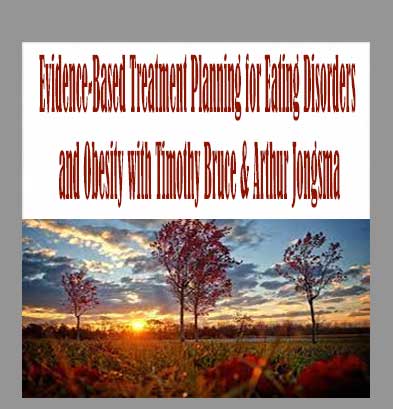Description
Evidence-Based Treatment Planning for Eating Disorders and Obesity with Timothy Bruce & Arthur Jongsma download , Evidence-Based Treatment Planning for Eating Disorders and Obesity with Timothy Bruce & Arthur Jongsma review , Evidence-Based Treatment Planning for Eating Disorders and Obesity with Timothy Bruce & Arthur Jongsma free
Evidence-Based Treatment Planning for Eating Disorders and Obesity with Timothy Bruce & Arthur Jongsma
Eating disorders have the highest mortality rate of any mental illness and pose immense challenges to clinicians, family members and, most of all, clients. Learn how to create a clear, well-developed treatment plan to sustain your efforts and maximize your chances for a successful outcome in this comprehensive video.
Eating disorders present a complex array of features that require nuanced assessment, focused interventions, and detailed treatment planning. Expert clinicians Drs. Timothy Bruce and Arthur Jongsma cover each of these areas at length in this comprehensive video, giving practitioners a solid empirical foundation on which to build evidence-based treatment plans. With thorough descriptions of symptoms and thoughtful commentary on case vignettes, Bruce and Jongsma have made this essential clinical process easier to understand and implement.
Noting that treatment plans aren’t created in a vacuum, but rather tailored to each client within the context of an authentic, empathic relationship, Bruce and Jongsma present an overview of three eating disorders (anorexia nervosa, bulimia nervosa, and binge eating disorder) and their respective DSM features, along with a description of obesity and its psychologically informed elements that may be responsive to clinical treatment. The two clinicians anchor this information with a six-step treatment planning process for eating disorders and obesity, geared toward building a plan consistent with empirically supported treatments (ESTs). A brief history of the EST movement provides further context.
You’ll find sample treatment plans here, along with the clinicians’ expert commentary on the most researched ESTs for eating disorders. Through a series of live demonstrations with clients and their family members, you’ll watch therapists incorporate skillful interventions (including psychoeducation, cognitive restructuring, parental involvement, and “surfing the urge”) based on the approaches of Family-Based Therapy, Cognitive-Behavioral Therapy, Interpersonal Therapy, and the LEARN model. Definitions, goals, and relapse prevention are covered, too, for a well-rounded set of tools you can start using immediately to support your clients’ improvement while meeting increasingly stringent professional standards.
If you’ve been searching for resources on eating disorders or need to know how to create evidence-based treatment plans with confidence, look no further than this comprehensive video.
In Depth
With disordered eating on the rise—particularly evidenced by the addition of binge eating disorder (BED) to the DSM-V—therapists need to understand the features and nuances of this clinical phenomenon. In addition, clinicians who tend to treat this population are increasingly required to submit empirically supported, measurable treatment plans—but what these plans actually look like hasn’t been as clearly defined. If you’ve been wondering what, exactly, are the differing criteria for eating disorders or have searched for resources on their empirically supported treatments, you’ll find answers in this new video with Drs. Timothy Bruce and Arthur Jongsma. Here, the two experts tell you everything you need to know about building treatment plans that pass muster with funding sources and serve as your own resource for supporting clients with anorexia nervosa, bulimia nervosa, Binge Eating Disorder, and obesity.
After presenting a brief history of the empirically supported treatment (EST) movement and an overview of the DSM criteria for eating disorders (noting that technically, obesity is not a clinical disorder yet is strongly influenced by psychological factors), Bruce and Jongsma outline several ways to integrate ESTs into eating disorder treatment. With a rundown of approaches that includes review, demonstration, and commentary, you’ll learn how to compose a six-step treatment plan based on Family-Based Therapy (aka the Maudsley Model), CBT for anorexia and bulimia, Interpersonal Therapy, and the LEARN model for obesity. Live case vignettes demonstrate interventions from these approaches, along with commentary, and you’ll also learn about relapse discussion and prevention.
If you’re looking to deepen your understanding of evidence-based treatment planning and the empirically supported treatments on which they’re based, be sure to add this information-packed video to your library.
By watching this video, you will:
- Understand the DSM criteria for three eating disorders and the related condition of obesity.
- Know the history of empirically supported treatments (ESTs) and those designated for eating disorders.
- Learn to build a six-step treatment plan for eating disorders informed by evidence-based practices.
Specs
Length of video: 1:20:30
English subtitles available
Bios
Timothy Bruce, PhD, is Professor and Associate Chair of the Department of Psychiatry and Behavioral Medicine. A summa cum laude graduate of the honors program curriculum at Indiana State University, Bruce received his Ph.D. in Clinical Psychology from The University at Albany-State University of New York under the mentorship of Dr. David Barlow. He completed his residency training at Wilford Hall USAF Medical Center under the direction of Dr. Robert Klepac.
Bruce is active in the clinical, educational, and scholarship missions of the department. He serves several administrative positions in the department including Associate Chair, Director of Medical Student Education, and Director of the Psychiatry Residency Scholarship Program. Bruce’s contributions to the literature include over 30 books and training manuals, as well as numerous professional journal articles, book chapters, encyclopedia articles, and other works. His areas of interests include education and training, the evidence-based practice of clinical psychology, and cognitive behavioral therapies. In addition to maintaining his own clinical practice, Bruce supervises the psychotherapy training of residents. Recognized for his work in academic administration as well as classroom and clinical teaching, Bruce has received over three dozen awards for his efforts in these areas to date.
Most recently, Bruce has been contributing editor and co-author of Arthur Jongsma’s widely used PracticePlanners© Series, empirically informing it with results from the psychotherapy outcome literature.
Frequently Asked Questions:
- Innovative Business Model:
- Embrace the reality of a genuine business! Our approach involves forming a group buy, where we collectively share the costs among members. Using these funds, we purchase sought-after courses from sale pages and make them accessible to individuals facing financial constraints. Despite potential reservations from the authors, our customers appreciate the affordability and accessibility we provide.
- The Legal Landscape: Yes and No:
- The legality of our operations falls into a gray area. While we lack explicit approval from the course authors for resale, there’s a technicality at play. When procuring the course, the author didn’t specify any restrictions on resale. This legal nuance presents both an opportunity for us and a boon for those seeking budget-friendly access.
- Quality Assurance: Unveiling the Real Deal:
- Delving into the heart of the matter – quality. Acquiring the course directly from the sale page ensures that all documents and materials are identical to those obtained through conventional means. However, our differentiator lies in going beyond personal study; we take an extra step by reselling. It’s important to note that we are not the official course providers, meaning certain premium services aren’t included in our package:
- No coaching calls or scheduled sessions with the author.
- No access to the author’s private Facebook group or web portal.
- No entry to the author’s exclusive membership forum.
- No direct email support from the author or their team.
We operate independently, aiming to bridge the affordability gap without the additional services offered by official course channels. Your understanding of our unique approach is greatly appreciated.
- Delving into the heart of the matter – quality. Acquiring the course directly from the sale page ensures that all documents and materials are identical to those obtained through conventional means. However, our differentiator lies in going beyond personal study; we take an extra step by reselling. It’s important to note that we are not the official course providers, meaning certain premium services aren’t included in our package:
Refund is acceptable:
- Firstly, item is not as explained
- Secondly, Item do not work the way it should.
- Thirdly, and most importantly, support extension can not be used.
Thank you for choosing us! We’re so happy that you feel comfortable enough with us to forward your business here.








Reviews
There are no reviews yet.